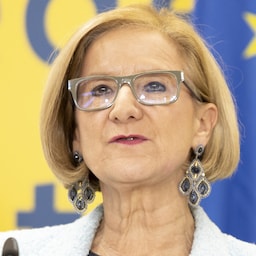"Funding state champion"
What the European Union means for Lower Austria
Blue-yellow funding champion: every euro that flows from our federal state to Brussels comes back threefold!
Peace and prosperity are the two pillars on which the European Union is based. The "Krone" has taken a look at what this has brought to our federal state. Over the past three decades, more than 13 billion (!) euros have flowed into Lower Austria from the EU for regional development, agriculture and research.
Subsidies a debt to be collected
A debt to be collected, of course, as Governor Johanna Mikl-Leitner emphasizes: "We are state champions when it comes to collecting funding!" This is because for every euro that flows from the vast country to Brussels, three euros are returned - a value that is unsurpassed in a comparison of federal states.
The European Union is therefore a community that not only protects us, but also benefits us economically.

Landeshauptfrau Johanna Mikl-Leitner
Bild: APA/TOBIAS STEINMAURER
It is obvious that this also has positive effects on the labor market: since 1995, the number of employees has increased by almost a third, economic output has tripled and export performance has even quadrupled. And: eight of the ten most important export markets are in member states.
The EU as a job engine
Since joining the EU in 1995, 15,500 new jobs have been created in the vast country with the help of the Regional Development Fund. In addition, 50,000 jobs have also been secured.
The extent to which EU policy, which is often criticized for being aloof and intangible, is reflected in this country is particularly noticeable in agriculture. As a red-white-red granary, Lower Austria not only has a great interest in, but also a strong voice in European agricultural policy. In this sector alone, around 12 billion euros have flowed into the vast country between Enns and Leitha since 1995.
High willingness to vote, but confidence is falling
Incidentally, two thirds of those eligible to vote wanted to go to the polls - even though many of those surveyed had a critical relationship with the EU. A third see mainly negative aspects in connection with membership. By contrast, not quite as many, namely 28%, have a clearly positive view. Before the European elections in 2019, these two figures were the exact opposite.
This article has been automatically translated,
read the original article here.











Kommentare
Willkommen in unserer Community! Eingehende Beiträge werden geprüft und anschließend veröffentlicht. Bitte achten Sie auf Einhaltung unserer Netiquette und AGB. Für ausführliche Diskussionen steht Ihnen ebenso das krone.at-Forum zur Verfügung. Hier können Sie das Community-Team via unserer Melde- und Abhilfestelle kontaktieren.
User-Beiträge geben nicht notwendigerweise die Meinung des Betreibers/der Redaktion bzw. von Krone Multimedia (KMM) wieder. In diesem Sinne distanziert sich die Redaktion/der Betreiber von den Inhalten in diesem Diskussionsforum. KMM behält sich insbesondere vor, gegen geltendes Recht verstoßende, den guten Sitten oder der Netiquette widersprechende bzw. dem Ansehen von KMM zuwiderlaufende Beiträge zu löschen, diesbezüglichen Schadenersatz gegenüber dem betreffenden User geltend zu machen, die Nutzer-Daten zu Zwecken der Rechtsverfolgung zu verwenden und strafrechtlich relevante Beiträge zur Anzeige zu bringen (siehe auch AGB). Hier können Sie das Community-Team via unserer Melde- und Abhilfestelle kontaktieren.